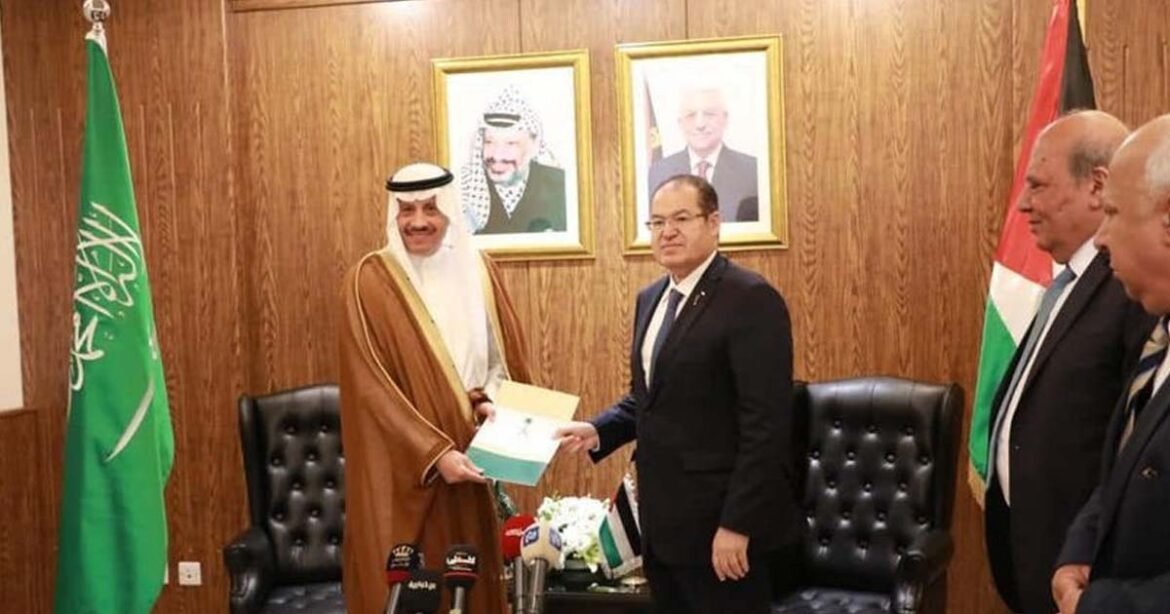Saudi Arabia has discreetly embraced the Abraham Accords—arrangements that fostered normalized relations between Israel and Gulf nations
On the recent announcement from Saudi Arabia, they have appointed a non-resident ambassador for the Palestinian Territories, who will also hold the position of consul general in Jerusalem. This move has come to light amidst discussions and conjecture regarding potential future relations between Saudi Arabia and Israel.
Who is Saudi Arabia’s pick?
As per a statement on social media by the Jordanian embassy and verified by an official from the Saudi foreign ministry, Nayef al-Sudairi, the present ambassador to Amman, has been selected as the inaugural non-resident ambassador from Saudi Arabia to the Palestinian Territories.
The appointment also signifies the commitment of King Salman and Crown Prince Mohammed bin Salman to enhance relationships with the State of Palestine and provide substantial support across various domains, stated al-Sudairi.
You can also read: Hunter Biden Corruption Controversy: How did Garland’s special counsel shift landscape?
This development coincides with Saudi Arabia’s reputed longstanding advocacy for the Palestinian cause and its avoidance of official connections with Israel. However, the United States, a close ally of Israel, has actively aimed to facilitate a potentially groundbreaking Middle East agreement that might encompass the normalization of Israeli-Saudi relations.
Palestinians welcome first Saudi ambassador
The initial non-resident Saudi Arabian ambassador has received a warm reception from Palestinian officials. As reported by the official Palestinian news agency Wafa, Majdi al-Khalidi, the diplomatic advisor to President Mahmoud Abbas, formally accepted the credentials of al-Sudairi at a ceremony held in Jordan.
The diplomatic advisor of the Palestinian president described this appointment as a “significant stride that will enhance the already robust fraternal connections between the two nations and their people,” as conveyed by Wafa.
An unnamed Palestinian Authority representative, speaking to AFP under the condition of anonymity, commented that with this announcement, “Saudi Arabia has reasserted its acknowledgment of the state of Palestine with Jerusalem as its capital.”
This development emerges in the context where Jerusalem stands as a key contentious point in potential peace negotiations between Israel and the Palestinians. The Palestinian source also noted, “This is a single part of a series of measures, and our engagement with them will continue to evolve.”
Is Saudi Arabia planning to establish ties with Israel?
Last year, during the Middle East tour of US President Joe Biden, the Saudi civil aviation authority made an announcement that it would be removing overflight restrictions for ‘all carriers,’ a decision that also opened the path for Israeli aircraft to utilize Saudi airspace.
Nonetheless, the kingdom subsequently refuted the notion that this airspace adjustment was a ‘precursor to any further measures’ aimed at normalizing relations with Israel. Saudi Arabia has consistently reiterated its commitment to the longstanding Arab League stance of refraining from establishing formal connections with Israel until a resolution is achieved in the Palestinian conflict.
Furthermore, Riyad al-Maliki, the Palestinian Foreign Minister, stated that the Western-supported Palestinian Authority has actively engaged with Saudi Arabia to express their apprehensions regarding the potential normalization of ties with Israel.
These developments coincide with Palestinian concerns that such an arrangement could potentially erode backing for their cause within the broader Arab world and undermine their aspirations for an independent Palestinian state.
Palestinian Foreign Minister Riyad al-Maliki disclosed that the Palestinian Authority, backed by Western nations and led by Abbas, is actively seeking dialogue with Saudi Arabia to address their apprehensions regarding the potential normalization with Israel.
Diplomatic Dilemmas: Saudi Arabia and Israel Relations
The geopolitical landscape in the Middle East has long been marred by complexities and conflicts. While the appointment of a non-resident ambassador to the Palestinian Territories reflects Saudi Arabia’s commitment to the Palestinian cause, it also raises questions about potential future relations with Israel.
In recent years, Saudi Arabia has shown hints of willingness to engage with Israel, especially with the removal of overflight restrictions for all carriers, which indirectly allowed Israeli aircraft to use Saudi airspace. However, Saudi Arabia has emphasized its adherence to the Arab League stance of refraining from formal ties with Israel until the Palestinian conflict is resolved.
Palestinian concern
According to statements from US, Israeli, and Saudi officials, any potential agreement of this nature is expected to be a considerable distance away, given the intricate challenges that must be navigated. These challenges encompass issues such as a surge in violence within the Israeli-occupied West Bank and the prospective development of civilian nuclear capabilities by Saudi Arabia.
Palestinians harbor concerns that any accord might diminish backing for their cause within the broader Arab realm and imperil their aspirations for the establishment of an autonomous Palestinian state.
While Saudi Arabia has discreetly embraced the Abraham Accords—arrangements that fostered normalized relations between Israel and Gulf nations, specifically the United Arab Emirates and Bahrain.
Recently, Israeli Prime Minister Benjamin Netanyahu expressed the belief that Palestinians should possess the capacity for self-governance without wielding the power to threaten Israel.
Nonetheless, certain members of his hard-right coalition have categorically ruled out making any concessions in this regard.


